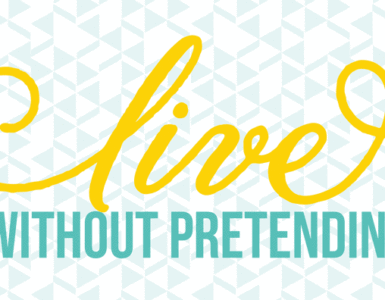Our goal this month on Studio 5 is to help you “Live without Pretending.”
We’re giving you a chance to put that theme into practice, starting with the conversations you have every day. Therapist Julie Hanks says it’s time to stop pretending you’re fine, when you’re not.
When someone asks, “How are you?”, do you automatically say, “I’m fine”? If so, you’re not alone. “Fine” seems to be the default answer for many of us. Sometimes we’re not fine but we feel like we should be fine. Here are some ways to stop pretending you’re find and become more authentic.
1) Assess the relationship
How close am I to this person? What are they really asking?
If an acquaintance asks, “How are you?” it’s different than if a close friend or family member asks. The more trust you have with someone and the closer the person, the more you can share your whole heart.
EXAMPLE: Went out to lunch with friends Monday. One of my friend’s mothers recently passed away and I wasn’t able to attend the funeral. When I asked her “How are you doing?” I really wanted to know. This is someone I’ve known for 20 years.
2) Tune in to your feelings
How am I doing?
It’s so easy to numb our difficult feelings through food, perfectionism, substances, focusing on others, or staying busy. Take time to be honest with yourself.
EXAMPLE: When working with client’s often turn a list of 6 basic emotions and ask am I more happy, mad, sad, scared, surprised or disgusted?
3) Embrace your truth
Do I allow myself the same struggles that I allow others?
Once you’ve identified what’s going on for you, try to accept it instead of judge it. Too often we tell ourselves, “I shouldn’t feel discouraged about that” or “I shouldn’t feel down. I have so much to be grateful for.”
EXAMPLE: Worked with a client struggling with perfectionism — one holds self to a higher standard than holds others.
4) Practice authenticity
Am I willing to share my whole heart with others?
Authenticity isn’t something you are or you aren’t. According to researcher Brene Brown, PhD authenticity is a practice. In her book The Gifts of Imperfection Brown says, “Authenticity is a collection of choices that we have to make every day. It’s about the choice to show up and be real. The choice to be honest. The choice to let our true selves be seen.”
EXAMPLE: My concert last Fri. I totally forgot one of the chord changes. Laughed and played around until I remembered it. Here’s a 25 second clip of the part of the concert where I forgot the chords! Feel free to use it in the segment. http://youtu.be/iA8Kg1-88-4 Talk about living without pretending!
5) Be brave
What will I gain if I share my real self with others?
It takes courage to be real and share your struggles, but the payoff is worth it. Closer relationships, more emotional support and help are just a few of the benefits of the benefits of sharing more of yourself with others.
EXAMPLE: Clients coming in for therapy are brave because they are admitting they’re not “fine”. There’s a problem and they can’t seem to figure out on their own.















Add comment